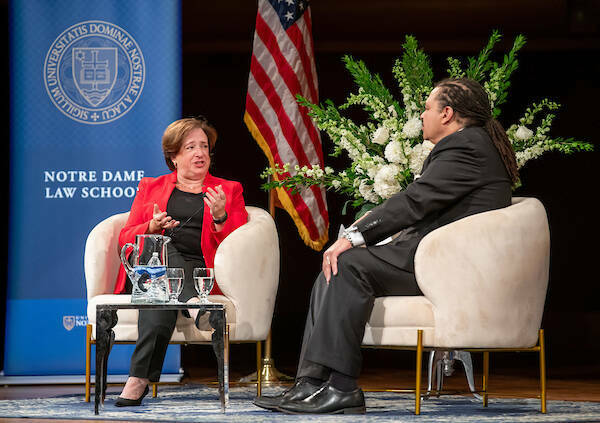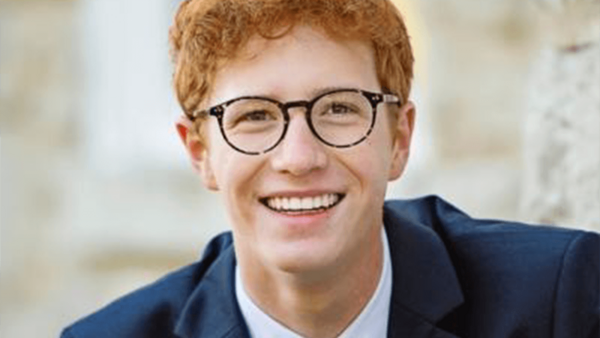US Supreme Court Justice Elena Kagan visits Notre Dame

U.S. Supreme Court Justice Elena Kagan visited the University of Notre Dame on Friday (Sept. 22).
Kagan spent the morning co-teaching a criminal law class for first-year Notre Dame Law School students and meeting with Law School faculty, and later joined G. Marcus Cole, the Joseph A. Matson Dean of the Law School, for a livestreamed conversation at the DeBartolo Performing Arts Center.
The talk was the first event of the 2023-24 Notre Dame Forum. Since its establishment in 2005 by University President Rev. John I. Jenkins, C.S.C., the Notre Dame Forum has invited a campus-wide dialogue about issues of importance to the University, the nation and the larger world. This year’s theme is “The Future of Democracy.”
In his opening remarks, Father Jenkins thanked Kagan for honoring Notre Dame with her visit and for her commitment to democratic ideals.
“Central to any strong democracy is a strong judiciary, and I can think of few people better equipped than Justice Kagan to kick off our yearlong conversation,” Father Jenkins said. “Justice Kagan has, throughout her career, devoted herself to protecting and advancing democratic principles, strengthening our judicial system, promoting civil discourse and creating opportunities for all.”
More than 800 Notre Dame students, faculty, staff and alumni attended the event, while hundreds more watched online. Kagan and Cole’s candid conversation covered a broad range of topics, including the justice’s approach to writing, whether the court should have taken on the Biden administration’s student loan debt relief program, how her Jewish faith informs her role as a justice, whether the Supreme Court should adopt a code of ethics, and her stance on originalism and the role of precedent in the courts.
The conversation began with a discussion of Kagan’s path to the Supreme Court, which included many years in academia, first as a professor at the University of Chicago Law School and Harvard Law School, and later as the first woman to serve as dean of Harvard Law School.
Drawing on her experience as a professor, Kagan said her teaching experience informs her opinion writing and her efforts to make the judicial process easier to understand.
“When I write my opinions I try hard to figure out how it is that I’m going to explain things to people,” she said. “I want to present ideas in a way that they are comprehensible to people. This is [a] democracy, and people in a democracy should be able to understand how our institutions of government work including the courts.”
Cole asked Kagan about her dissent in several recent cases, including Rucho v. Common Cause, a 2019 case concerning partisan gerrymandering, which she described as one of the most important dissents she has ever written.
“One place where the court has the most responsibility is to actually protect the mechanisms of democracy itself,” she said. “If the democratic system is structured in a fair way, if everybody’s vote is counted and is relatively equal to every other person’s vote, then you let the democratic process work and whatever outcomes it produces. If the rules are skewed from the outset … then the results are going to be skewed. The one place where the court has a role is to protect the institution of representative government.”
Cole also invited Kagan to discuss her views on originalism. She described a framework where, in her view, constitutional meaning evolves and develops over time, and she believes this is consistent with the framers’ intent.
“These people were speaking for the ages, and they knew it,” Kagan said. “If there was anybody who understood how the world changes, it was those people. How societies change, how governments change, how people change. They had brought on a revolution. They wanted the constitution to be fit to govern a people as that people lived over time.”
As the conversation continued, Kagan stressed that this philosophy does not mean courts are free to do what they want.
“Constraint, discipline and incrementalism are really important judicial values,” Kagan said.
She also emphasized adherence to precedent as a key to stability in legal development and to prevent the court from appearing ideologically driven.
“People have no right to expect that they are going to agree with all the decisions that courts make,” she said. “But people do want courts — and have a right to expect — that courts act like courts, and that they don’t look like other political actors.”
Cole also asked Kagan how universities and law schools can create an environment where people feel free to speak their minds in the midst of increasing polarization.
“This nation cannot work or do the things it needs to do unless people can talk with each other, and really try to understand each other and learn from each other,” Kagan said. “This will not happen unless people work together across various disagreements, as profound as they may be.”
Kagan said this is especially important in educational institutions focused on learning, engagement and free exchange of ideas.
After the event, second-year law student Mackenzie Krage said, “Having Justice Kagan grace our law school with her wisdom and experience was truly a remarkable privilege. The conversation she shared with Dean Cole served as a reminder that the pursuit of justice is not just a concept we study, but an important force in our democracy to which courts can protect its future.”
Cole said the visit provided students an invaluable glimpse into the workings of the highest court and served as a reminder that Notre Dame is a welcoming place for free and respectful intellectual exchange.
“We were honored to host Justice Kagan at Notre Dame Law School,” Cole said. “I am happy that so many of our students had the opportunity to hear from and engage with her during her time with us.”
Watch the full recording of Justice Kagan’s conversation with Dean Marcus Cole.
Latest ND News Wire
- Division of Student Affairs awards scholarships to student leadersThe University of Notre Dame’s Division of Student Affairs recently recognized 15 junior undergraduate students with scholarships for the 2025-26 academic year for their demonstrated leadership and ongoing commitment to the holistic development of Notre Dame students.
- Notre Dame celebrates new pope; Father Dowd offers prayersRev. Robert A. Dowd, C.S.C., president of the University of Notre Dame, offered his prayers for Pope Leo XIV, elected by the College of Cardinals today in Vatican City as the 267th pontiff of the Catholic Church.
- Clare Cullinan named valedictorian, Bennett Schmitt selected as salutatorian for the Class of 2025Clare Cullinan of South Bend, Indiana, has been named valedictorian and Bennett Schmitt from Jasper, Indiana, has been selected as salutatorian of the 2025 University of Notre Dame graduating class. The 180th University Commencement Ceremony will be held May 18 (Sunday) in Notre Dame Stadium for graduates and guests. During the ceremony, Cullinan will present the valedictory address, and as salutatorian, Schmitt will offer the invocation.
- Notre Dame’s Fightin’ Irish Battalion receives Department of Defense award as nation’s top Army ROTC programThe United States Department of Defense honored the University of Notre Dame’s Army ROTC Fightin’ Irish Battalion as the nation’s top Army collegiate program for the 2023-24 academic year. This will be the first time the unit has received the department’s Educational Institution Partnership Excellence Award, which recognizes the program’s achievements in recruiting, educating, training and commissioning leaders of character to be the next generation of military officers.
- Senior James Reintjes named 2025 Yenching ScholarUniversity of Notre Dame senior James Reintjes has been named a 2025 Yenching Scholar. He is one of 114 Yenching Scholars overall, representing 40 countries and regions around the globe. He is Notre Dame’s 12th Yenching Scholar and its 9th since 2018.
- Junior Cade Czarnecki named 2025 Phi Beta Kappa Key into Public Service ScholarUniversity of Notre Dame junior Cade Czarnecki is among 20 recipients of a 2025 Key Into Public Service Scholarship from Phi Beta Kappa. He is Notre Dame’s fifth Key Into Public Service Scholar since the program was established in 2020.













